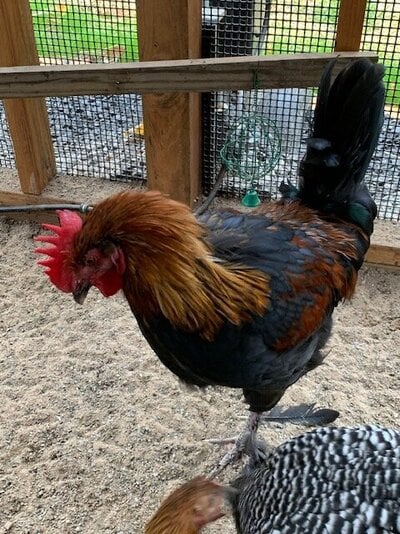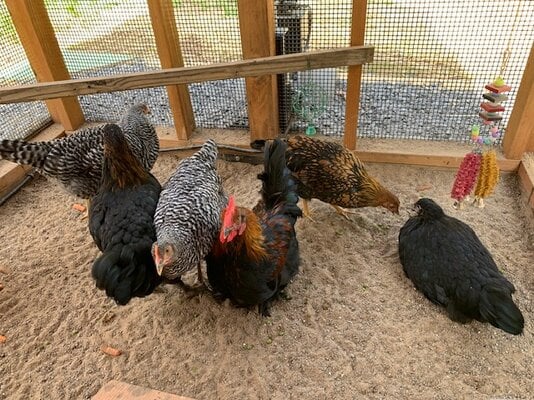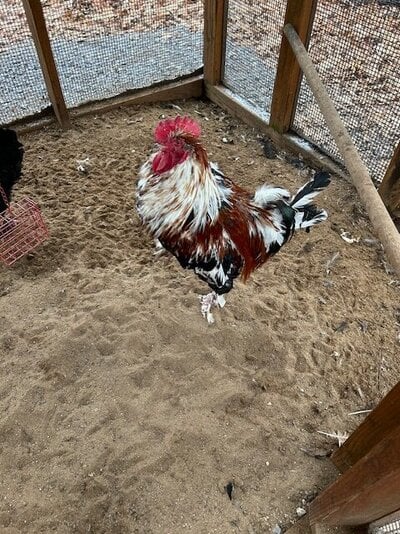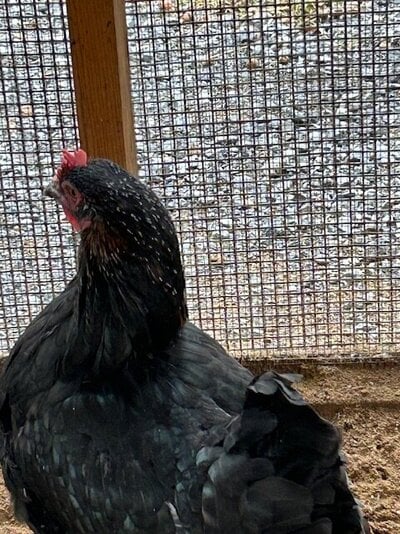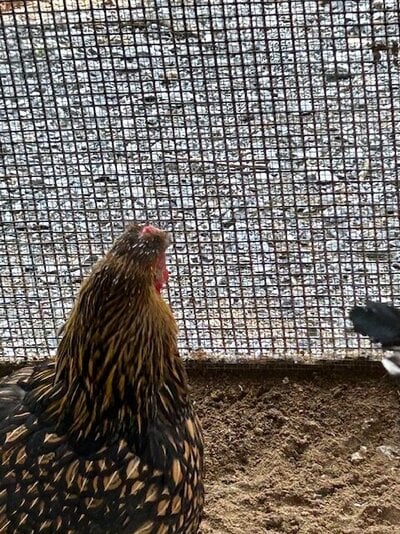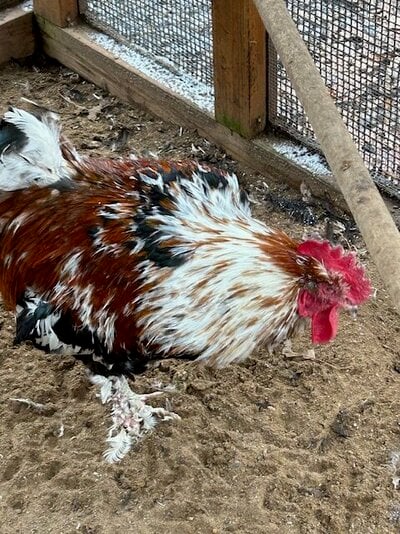I have multiple hens and one rooster, all hatched on the same day and now 4 1/2 years old. In the last 6 months, the roosters feathers around his beautiful ruff have changed from a vivid copper to white, as has his feathers on his head. Now I have his black Copper Maran hens showing white feathers on their heads as if they are turning gray. I just saw my 2 Gold Lace Wyandottes, who are housed separately and have no contact with the rooster's flock, are also showing a dusting of white feathers on their heads. They have been treated for mites and appear to be in good health but I don't want to miss some illness that I've never heard of. Do chickens go "gray" when they are older? I've never heard of it before. Pictures on left are of the chickens I'm referring to when they were young- they developed even more fullness and beautiful coloring as they aged. The ones on the right are what they look like now... thanks!
Navigation
Install the app
How to install the app on iOS
Follow along with the video below to see how to install our site as a web app on your home screen.
Note: This feature may not be available in some browsers.
More options
You are using an out of date browser. It may not display this or other websites correctly.
You should upgrade or use an alternative browser.
You should upgrade or use an alternative browser.
Older chickens going gray?
- Thread starter minaayindra
- Start date
GirlsHuntToo
Professional Chicken Chaser
I am really not sure but WOW your rooster is beautiful. If you ever wanted to get rid of him I would love to have him!! lol 
Old age usually produces maybe 2-3 white feathers on a chicken. But most common is white spots on the head, or eyebrows.I've had him at an avian vet who said there is absolutely nothing on or in his skin so I'm at a loss, especially since some of the girls are becoming salt and pepper as well (granted, he is all salt now). He does have a hen who picks on him and the guineas recently removed some of his tail feathers during a fight so the lack of feathers isn't the issue.
He reminds me of my Project Chameleons I'm working on.
Yep.Project chameleons?
This hen turned 3 this year, change happened last year at the age of 2. The mother also changed last year, she's about 5 now.
Bad picture.
- Thread starter
- #3
I've had him at an avian vet who said there is absolutely nothing on or in his skin so I'm at a loss, especially since some of the girls are becoming salt and pepper as well (granted, he is all salt now). He does have a hen who picks on him and the guineas recently removed some of his tail feathers during a fight so the lack of feathers isn't the issue. I don't believe some of these vets are experienced enough to know the answers, like people who have been with chickens for years- he said they are always killed before the age of 2 so there is no research on poultry diseases except for the food industry.That's alittle extreme for it just being old age.
I've got a rooster around the same age, looks nothing like that.
GirlsHuntToo
Professional Chicken Chaser
Do you know what breed or mix of breeds he is?? I would love to breed one just like him.
I don't think that its really anything to worry about. Is he getting whiter as he molts because he could be part Speckled Sussex and if that is the case then they do get whiter each time they molt or lose feathers - they come back even whiter.
I am thinking that could be the answer you are looking for!
I don't think that its really anything to worry about. Is he getting whiter as he molts because he could be part Speckled Sussex and if that is the case then they do get whiter each time they molt or lose feathers - they come back even whiter.
I am thinking that could be the answer you are looking for!

- Thread starter
- #9
Sorry, Billy has always been my best buddy since he hatched (he was a surprise when he began to act like a rooster!). He has so many amazing qualities and I have never lost a hen since he came along. In addition, he is so sweet that he won't even stop the aggressive hen from picking on him- I don't know any roosters that are that kind. In spite of his not wanting me to bother "his" hens, he is fine being carried around when off-duty. 

Last edited:
An All Flock type feed, or Flock Raiser. It's high protein, & great for all ages, & genders. Just gotta be sure to have a calcium source like Oyster shells in a separate container, or feeder for the hens. They know how much they need, & regulate on their own.Yikes, I just always gave it to all of my hens. I had no idea it was specific to certain hens. So, if I have a flock with hens and Billy, what is the best feed you would recommend? I really can't separate their food sources.
Your hens look to me like they just have the feather sheaths stuck on some of their feathers. It's hard to tell for sure from the pictures because they blur when I try to zoom, but the shape looks like feather sheaths to me. If that's not the case and those are actual feathers that are white, then I would think aging for them. I've only had it happen to a few of my old hens, not all of them. My very eldest at 13 years old does not have any white feathers, but a broodmate of hers had a few.
The rooster is pretty typical of vitiligo in chickens. It is not well studied beyond a line of birds who were selectively bred to have it trigger very early on in life in order to reliably be able to study vitiligo. Some of what we know about vitiligo in chickens, we aren't sure whether it goes for all chickens with vitiligo or coincidentally has occurred within that studied line alongside it. What we do know is that it seems to be a polygenic trait, and that birds with it don't very often show outward signs of autoimmune issues, so even if he is as robust and healthy as always it could still be vitiligo. There are rare feather quality issues with it, sometimes roosters can become infertile, and vision loss and eventual blindness is fairly common in the birds from the selectively bred line I mentioned above, but again it is unknown if that's the same with the randomly occurring vitiligo you see in backyard flocks or coincidental with the line for studying. Other than that, the birds outwardly show no signs of issues beyond that they have lost pigment in some or all of their plumage. Basically, all it does is cause the immune system to attack the cells that produce pigment for their feathers.
The rooster is pretty typical of vitiligo in chickens. It is not well studied beyond a line of birds who were selectively bred to have it trigger very early on in life in order to reliably be able to study vitiligo. Some of what we know about vitiligo in chickens, we aren't sure whether it goes for all chickens with vitiligo or coincidentally has occurred within that studied line alongside it. What we do know is that it seems to be a polygenic trait, and that birds with it don't very often show outward signs of autoimmune issues, so even if he is as robust and healthy as always it could still be vitiligo. There are rare feather quality issues with it, sometimes roosters can become infertile, and vision loss and eventual blindness is fairly common in the birds from the selectively bred line I mentioned above, but again it is unknown if that's the same with the randomly occurring vitiligo you see in backyard flocks or coincidental with the line for studying. Other than that, the birds outwardly show no signs of issues beyond that they have lost pigment in some or all of their plumage. Basically, all it does is cause the immune system to attack the cells that produce pigment for their feathers.
- Thread starter
- #5
Project chameleons?Old age usually produces maybe 2-3 white feathers on a chicken. But most common is white spots on the head, or eyebrows.
He reminds me of my Project Chameleons I'm working on.
New posts New threads Active threads
-
Latest threads
-
-
-
-
Coop foundation challenges
- Started by HowIsItDone
- Replies: 0
-
-
-
Threads with more replies in the last 15 days
-
Open Contest May Madness, a Random Funny Posting Contest
- Started by casportpony
- Replies: 2K
-
What’s the deal with you chicken people??
- Started by z3lda3
- Replies: 805
-
Open Contest 2025 BYC Calendar Photo Contest—We Need Your Pictures!
- Started by casportpony
- Replies: 223
-
-
So..If a Kangaroo and a Ostrich fight..who would win?
- Started by ashyechidna
- Replies: 129
-

